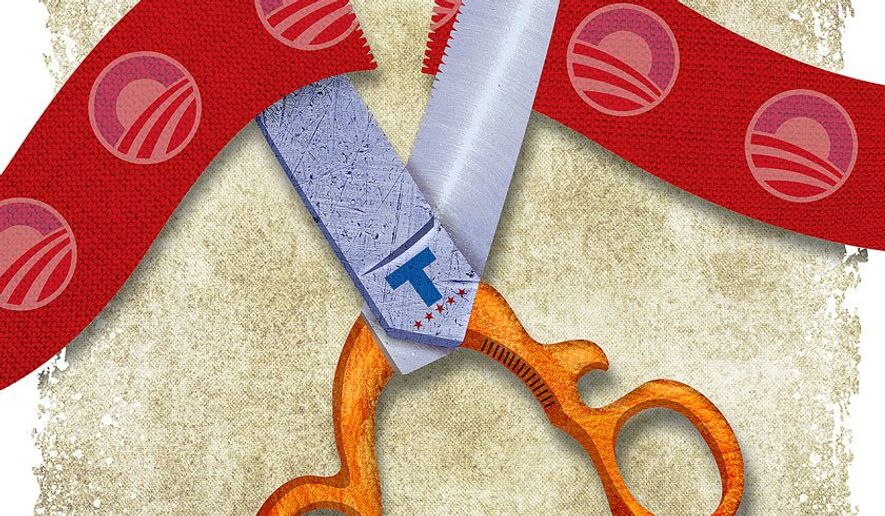OPINION:
On Thanksgiving Day, President Trump took to Twitter to remind Americans how much they had to be thankful for during his first year in office, citing a soaring stock market, a “record” cut in regulations, and the “lowest unemployment in 17 years.” Was the president’s self-issued report card accurate?
Earlier this year, my organization, Consumers’ Research, outlined some onerous rules and regulations adopted under the previous presidency that we believed the Trump administration needed to address because of their adverse effects on American consumers. Reviewing those issues now, it seems the president does have some good reasons to boast — but there is more work to do.
For much of the year, the Consumer Financial Protection Bureau (CFPB) continued operating under its director, Richard Cordray, as a going concern of the previous administration without interference from the new administration. Under Mr. Cordray’s direction, the agency aggressively limited consumer choice by restricting access to small-dollar credit sources and limiting the effectiveness of prepaid cards as a substitute for the formal banking services that many consumers can’t afford.
In one of its most politically motivated gambits, the CFPB sought to push consumers toward class-action litigation by banning the use of mandatory arbitration clauses in financial services contracts, despite the Bureau’s own research indicating that consumers fared better under mandatory arbitration. Consumers’ Research advocated for the repeal of the CFPB’s rule banning mandatory arbitration, and the president recently signed legislation overriding that very rule, securing a much-needed victory for consumers.
Consumers should also be pleased with the administration’s position against federal attempts to heavily regulate the Internet via “Net Neutrality.” When the Federal Communications Commission (FCC) implemented this policy during President Obama’s second term, it applied telecommunications laws from the 1930s — known as Title II regulations — to Internet Service Providers (ISPs), which limits their ability to effectively manage their networks better serve consumers.
Though its supporters present Net Neutrality as a way to protect consumer interests, imposing Title II regulations on ISPs reversed two decades of a light touch regulatory approach that fostered the Internet’s remarkable growth. Recognizing that a truly open Internet hinges on robust competition and the incentive to invest in infrastructure and innovation, Ajit Pai, the Trump-appointed FCC Chairman, announced that the agency would soon vote to repeal the rules classifying ISPs as public utilities, enabling communication and marketplaces to thrive. That happened on Thursday.
In the digital era, consumers have been far better served by innovation than regulation. Recently, Chairman Pai and Federal Trade Commission Acting Chairman Maureen K. Ohlhausen announced a Memorandum of Understanding between the agencies to ensure a new level of transparency and disclosure that the Title II regulations sorely lacked.
The current administration’s repeal of the Obama-era Clean Power Plan (CPP) delivered another financial benefit to consumers. The Environmental Protection Agency instituted these onerous rules that would have cost Americans as much as $292 billion between 2022 and 2033 while raising the cost of electricity by as much as 14 percent.
In March, Mr. Trump began rolling back the CPP by signing the Executive Order on Energy Independence, which directed the new leadership at the EPA to “suspend, revise, or rescind the guidance, or publish for notice and comment proposed rules suspending, revising, or rescinding those rules” when appropriate. In October, Trump-appointed EPA administrator Scott Pruitt signed a proposed rule that would withdraw the regulations.
Mr. Trump also showed a commitment to a more consumer-centric approach at the Food and Drug Administration (FDA) by tapping Scott Gottlieb as the new commissioner. With a focus on preserving America’s global edge in innovation and new drug development, Commissioner Gottlieb has also prioritized lower drug prices.
Under Mr. Gottlieb, the FDA has promised to increase the availability of generic drugs, make the U.S.’ convoluted drug approval process more efficient, and boost the agency’s transparency. Reforms at the FDA were long overdue, and the new commissioner has already begun pressing the regulatory body to improve the affordability of medicine while allowing pharmaceutical research and development to thrive.
There is certainly more work to do in 2018, but the Trump administration deserves credit for its bold executive action on behalf of consumers — rolling back regulations that stifled innovation, increased costs, limited consumer choice, and impeded economic growth — making 2017 an encouraging start.
• Beau Brunson is senior policy analyst at Consumers’ Research, the nation’s oldest consumer organization.




Please read our comment policy before commenting.